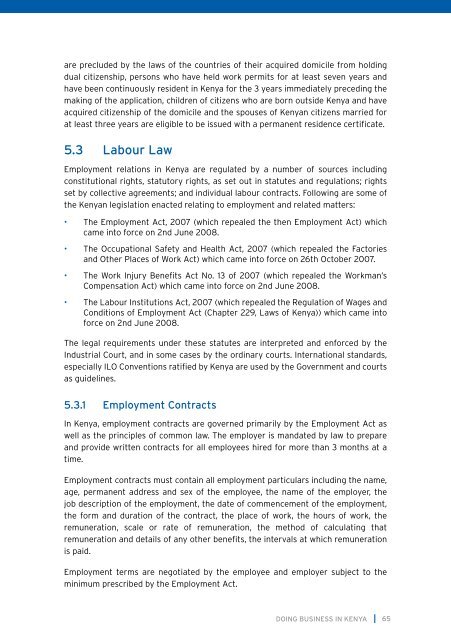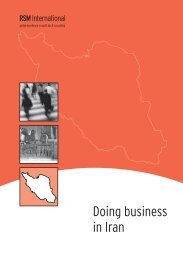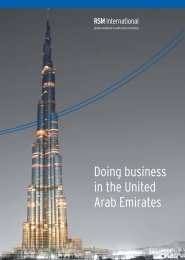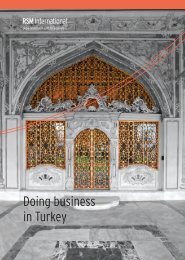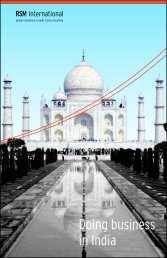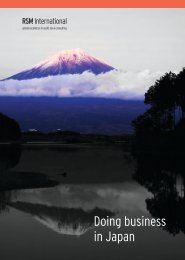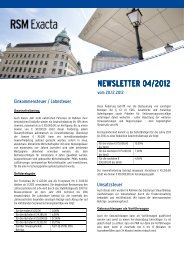Doing Business in Kenya - RSM International
Doing Business in Kenya - RSM International
Doing Business in Kenya - RSM International
- No tags were found...
You also want an ePaper? Increase the reach of your titles
YUMPU automatically turns print PDFs into web optimized ePapers that Google loves.
are precluded by the laws of the countries of their acquired domicile from hold<strong>in</strong>gdual citizenship, persons who have held work permits for at least seven years andhave been cont<strong>in</strong>uously resident <strong>in</strong> <strong>Kenya</strong> for the 3 years immediately preced<strong>in</strong>g themak<strong>in</strong>g of the application, children of citizens who are born outside <strong>Kenya</strong> and haveacquired citizenship of the domicile and the spouses of <strong>Kenya</strong>n citizens married forat least three years are eligible to be issued with a permanent residence certificate.5.3 Labour LawEmployment relations <strong>in</strong> <strong>Kenya</strong> are regulated by a number of sources <strong>in</strong>clud<strong>in</strong>gconstitutional rights, statutory rights, as set out <strong>in</strong> statutes and regulations; rightsset by collective agreements; and <strong>in</strong>dividual labour contracts. Follow<strong>in</strong>g are some ofthe <strong>Kenya</strong>n legislation enacted relat<strong>in</strong>g to employment and related matters:• The Employment Act, 2007 (which repealed the then Employment Act) whichcame <strong>in</strong>to force on 2nd June 2008.• The Occupational Safety and Health Act, 2007 (which repealed the Factoriesand Other Places of Work Act) which came <strong>in</strong>to force on 26th October 2007.• The Work Injury Benefits Act No. 13 of 2007 (which repealed the Workman’sCompensation Act) which came <strong>in</strong>to force on 2nd June 2008.• The Labour Institutions Act, 2007 (which repealed the Regulation of Wages andConditions of Employment Act (Chapter 229, Laws of <strong>Kenya</strong>)) which came <strong>in</strong>toforce on 2nd June 2008.The legal requirements under these statutes are <strong>in</strong>terpreted and enforced by theIndustrial Court, and <strong>in</strong> some cases by the ord<strong>in</strong>ary courts. <strong>International</strong> standards,especially ILO Conventions ratified by <strong>Kenya</strong> are used by the Government and courtsas guidel<strong>in</strong>es.5.3.1 Employment ContractsIn <strong>Kenya</strong>, employment contracts are governed primarily by the Employment Act aswell as the pr<strong>in</strong>ciples of common law. The employer is mandated by law to prepareand provide written contracts for all employees hired for more than 3 months at atime.Employment contracts must conta<strong>in</strong> all employment particulars <strong>in</strong>clud<strong>in</strong>g the name,age, permanent address and sex of the employee, the name of the employer, thejob description of the employment, the date of commencement of the employment,the form and duration of the contract, the place of work, the hours of work, theremuneration, scale or rate of remuneration, the method of calculat<strong>in</strong>g thatremuneration and details of any other benefits, the <strong>in</strong>tervals at which remunerationis paid.Employment terms are negotiated by the employee and employer subject to them<strong>in</strong>imum prescribed by the Employment Act.DOING BUSINESS IN KENYA65


